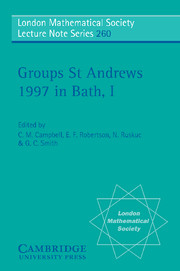Book contents
- Frontmatter
- Contents
- Contents of Volume II
- Introduction
- Radical rings and products of groups
- Homogeneous integral table algebras of degrees two, three and four with a faithful element
- A polynomial-time theory of black box groups I
- Totally and mutually permutable products of finite groups
- Ends and algebraic directions of pseudogroups
- On locally nilpotent groups with the minimal condition on centralizers
- Infinite groups in projective and symplectic geometry
- Non-positive curvature in group theory
- Group-theoretic applications of non-commutative toric geometry
- Theorems of Kegel-Wielandt type
- Singly generated radicals associated with varieties of groups
- The word problem in groups of cohomological dimension
- Polycyclic-by-finite groups: from affine to polynomial structures
- On groups with rank restrictions on subgroups
- On distances of multiplication tables of groups
- The Dade conjecture for the McLaughlin group
- Automorphism groups of certain non-quasiprimitive almost simple graphs
- Subgroups of the upper-triangular matrix group with maximal derived length and a minimal number of generators
- On p-pronormal subgroups of finite p-soluble groups
- On the system of defining relations and the Schur multiplier of periodic groups generated by finite automata
- On the dimension of groups acting on buildings
- Dade's conjecture for the simple Higman-Sims group
- On the F*-theorem
- Covering numbers for groups
- Characterizing subnormally closed formations
- Symmetric words in a free nilpotent group of class 5
- A non-residually finite square of finite groups
Theorems of Kegel-Wielandt type
Published online by Cambridge University Press: 05 August 2013
- Frontmatter
- Contents
- Contents of Volume II
- Introduction
- Radical rings and products of groups
- Homogeneous integral table algebras of degrees two, three and four with a faithful element
- A polynomial-time theory of black box groups I
- Totally and mutually permutable products of finite groups
- Ends and algebraic directions of pseudogroups
- On locally nilpotent groups with the minimal condition on centralizers
- Infinite groups in projective and symplectic geometry
- Non-positive curvature in group theory
- Group-theoretic applications of non-commutative toric geometry
- Theorems of Kegel-Wielandt type
- Singly generated radicals associated with varieties of groups
- The word problem in groups of cohomological dimension
- Polycyclic-by-finite groups: from affine to polynomial structures
- On groups with rank restrictions on subgroups
- On distances of multiplication tables of groups
- The Dade conjecture for the McLaughlin group
- Automorphism groups of certain non-quasiprimitive almost simple graphs
- Subgroups of the upper-triangular matrix group with maximal derived length and a minimal number of generators
- On p-pronormal subgroups of finite p-soluble groups
- On the system of defining relations and the Schur multiplier of periodic groups generated by finite automata
- On the dimension of groups acting on buildings
- Dade's conjecture for the simple Higman-Sims group
- On the F*-theorem
- Covering numbers for groups
- Characterizing subnormally closed formations
- Symmetric words in a free nilpotent group of class 5
- A non-residually finite square of finite groups
Summary
1991 Mathematics Subject Classification: Primary 20F17,20D40; Secondary 20D25, 20E28.
For not explicitly explained concepts used in this report, the cited literature or usual books in finite group theory may be consulted.
Based on W. Burnside's famous theorem, published in 1904 [5], which states that a finite group is soluble, if its order is divisible by at most two distinct prime numbers, P. Hall characterizes the soluble groups in the decade 1928 – 1937, by means of the existence of Sylow complements and Sylow systems [15, 16, 17]. In particular:
A finite group is soluble if and only if it is the product of pairwise permutable Sylow subgroups.
With this characterization arises the question:
If a finite group is the product of pairwise permutable nilpotent subgroups, the group is soluble?
In 1951, H. Wielandt [28] begins with a series of theorems which he finishes in 1958 [29] and which together with a result of O. H. Kegel 1962 [21] answers affirmatively to this question.
Meanwhile, in 1953, B. Huppert [19] solves a particular case of the problem, which merits to be mentioned:
A finite group which is the product of pairwise permutable cyclic subgroups is supersoluble.
- Type
- Chapter
- Information
- Groups St Andrews 1997 in Bath , pp. 195 - 201Publisher: Cambridge University PressPrint publication year: 1999
- 4
- Cited by



